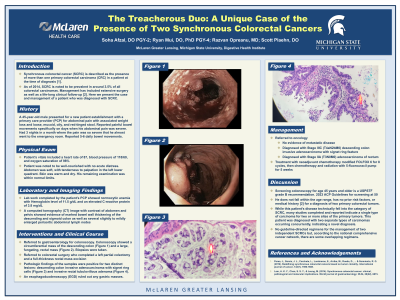Sunday Poster Session
Category: Colorectal Cancer Prevention
P0373 - The Treacherous Duo: A Unique Case of Two Synchronous Colorectal Cancers
Sunday, October 22, 2023
3:30 PM - 7:00 PM PT
Location: Exhibit Hall

Has Audio
- SA
Soha Afzal, DO, MS
McLaren Greater Lansing/MSU
Lansing, Michigan
Presenting Author(s)
Soha Afzal, DO, MS1, Ryan Mui, MD, PhD2, Scott Plaehn, DO1
1McLaren Greater Lansing/MSU, Lansing, MI; 2Sparrow Hospital/MSU, Lansing, MI
Introduction: Synchronous colorectal cancer (SCRC) occurs in patients diagnosed with more than one colorectal carcinoma (CRC). SCRC is rare, with a prevalence of 3.5% in colorectal cancer and often occurs in individuals in their 7th decade of life. Management includes surgery and life-long clinical follow-up. Here we present the case and management of a patient who was diagnosed with SCRC.
Case Description/Methods: A 45-year-old male presents to establish care with a primary care physician who had a history of abdominal pain associated with oily mucoid diarrhea, hematochezia, and unintentional weight loss. Computed tomography with contrast of abdomen and pelvis showed evidence of marked bowel wall thickening of the descending and sigmoid colon and mildly enlarged periaortic abdominal lymph nodes. He underwent colonoscopy, which identified a circumferential mass in the descending colon and a large rectal mass. Biopsies were taken that showed invasive adenocarcinoma and tubulovillous adenoma, respectively. He underwent left partial colectomy and rectal mass biopsy with pathology confirming invasive adenocarcinoma with signet ring cells in the descending colon and invasive rectal adenocarcinoma. He subsequently underwent full-thickness rectal mass excision, with pathology demonstrating marginal tumor extension.
Discussion: This is the case of a young male with no prior risk factors or medical history that was diagnosed with two primary colorectal tumors. He does not meet colon cancer screening criteria and he also does not fall within the age range that SCRC is found. Without the presentation of his alarm symptoms, his tumors would likely not be found until it was too late to manage. While this patient’s disease technically fell into the category of SCRC, many studies completed and reported indicate a single type of carcinoma for two or more sites of the primary tumors. There are currently no guideline-directed regimens for the management of two independent SCRCs but, according to the national comprehensive cancer network, there are some overlapping regimens. These patients will require close follow-up and surveillance regardless of the method of further management that is explored. Screening colonoscopy at age 45 is currently a grade B United States Preventative Screening Task Force (USPSTF) recommendation. Perhaps this recommendation may need to be re-evaluated to a grade A level.
Disclosures:
Soha Afzal, DO, MS1, Ryan Mui, MD, PhD2, Scott Plaehn, DO1. P0373 - The Treacherous Duo: A Unique Case of Two Synchronous Colorectal Cancers, ACG 2023 Annual Scientific Meeting Abstracts. Vancouver, BC, Canada: American College of Gastroenterology.
1McLaren Greater Lansing/MSU, Lansing, MI; 2Sparrow Hospital/MSU, Lansing, MI
Introduction: Synchronous colorectal cancer (SCRC) occurs in patients diagnosed with more than one colorectal carcinoma (CRC). SCRC is rare, with a prevalence of 3.5% in colorectal cancer and often occurs in individuals in their 7th decade of life. Management includes surgery and life-long clinical follow-up. Here we present the case and management of a patient who was diagnosed with SCRC.
Case Description/Methods: A 45-year-old male presents to establish care with a primary care physician who had a history of abdominal pain associated with oily mucoid diarrhea, hematochezia, and unintentional weight loss. Computed tomography with contrast of abdomen and pelvis showed evidence of marked bowel wall thickening of the descending and sigmoid colon and mildly enlarged periaortic abdominal lymph nodes. He underwent colonoscopy, which identified a circumferential mass in the descending colon and a large rectal mass. Biopsies were taken that showed invasive adenocarcinoma and tubulovillous adenoma, respectively. He underwent left partial colectomy and rectal mass biopsy with pathology confirming invasive adenocarcinoma with signet ring cells in the descending colon and invasive rectal adenocarcinoma. He subsequently underwent full-thickness rectal mass excision, with pathology demonstrating marginal tumor extension.
Discussion: This is the case of a young male with no prior risk factors or medical history that was diagnosed with two primary colorectal tumors. He does not meet colon cancer screening criteria and he also does not fall within the age range that SCRC is found. Without the presentation of his alarm symptoms, his tumors would likely not be found until it was too late to manage. While this patient’s disease technically fell into the category of SCRC, many studies completed and reported indicate a single type of carcinoma for two or more sites of the primary tumors. There are currently no guideline-directed regimens for the management of two independent SCRCs but, according to the national comprehensive cancer network, there are some overlapping regimens. These patients will require close follow-up and surveillance regardless of the method of further management that is explored. Screening colonoscopy at age 45 is currently a grade B United States Preventative Screening Task Force (USPSTF) recommendation. Perhaps this recommendation may need to be re-evaluated to a grade A level.
Disclosures:
Soha Afzal indicated no relevant financial relationships.
Ryan Mui indicated no relevant financial relationships.
Scott Plaehn indicated no relevant financial relationships.
Soha Afzal, DO, MS1, Ryan Mui, MD, PhD2, Scott Plaehn, DO1. P0373 - The Treacherous Duo: A Unique Case of Two Synchronous Colorectal Cancers, ACG 2023 Annual Scientific Meeting Abstracts. Vancouver, BC, Canada: American College of Gastroenterology.
